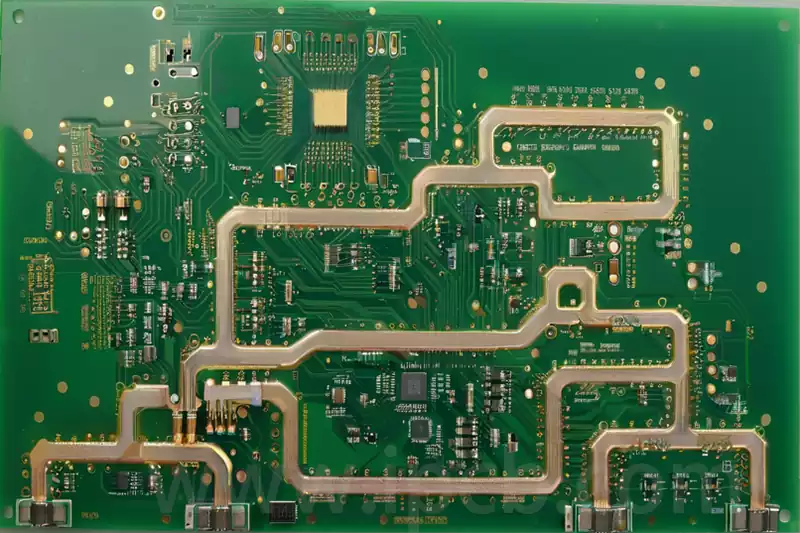Teflon PCB, also known as polytetrafluoroethylene (PTFE) PCB, is a special type of printed circuit board widely used in high-performance electronics.
Teflon PCB is based on the PTFE material, which has an extremely low dielectric constant (usually around 2.1 to 2.3) and a very low loss factor, which minimises attenuation and distortion during signal transmission and greatly enhances the integrity and stability of high-frequency signals. Its excellent high temperature resistance and ability to withstand operating environments up to 260°C ensures stable operation in high power applications. In addition, Teflon PCBs have excellent chemical resistance and low moisture absorption, making them suitable for use in harsh industrial and aerospace environments.
PTFE (Poly tetra fluoroethylene, abbreviation: F4, all known as polytetrafluoroethylene, also known as: Teflon, Teflon, Teflon, Tauflon, DEFLON, trademark Teflon, the Chinese translation of the name of the different places: the mainland translated as Teflon, Hong Kong, Teflon, Teflon in Taiwan.
Polytetrafluoroethylene, the trade name is ‘Teflon’ (Teflon), commonly known as ‘Plastic King’. 1938, the United States of America, New Jersey, DuPont Research Laboratory, Dr. R.S. Plunkett first invented polytetrafluoroethylene, commercialised in 1946. PTFE is a highly crystalline polymer of tetrafluoroethylene (TFE) monomer, white, non-toxic and odourless. Its polymer molecule is made of a (a CF2 a CF2 a) a structural unit repeated connection, is currently the latest type of engineering plastics used in various industries.
Teflon material properties:
Teflon has excellent chemical resistance, which is mainly due to its molecular structure of fluorine atoms tightly wrapped around the carbon skeleton, making it difficult for most chemical substances to come into contact with and react with the carbon atoms, thus giving it a strong resistance to acids and alkalis, solvents and oxidants. In addition, Teflon surface is difficult to adhere to chemical substances, further enhancing its chemical resistance.
In terms of temperature adaptability, Teflon's use of a wide range of temperatures, usually from -200 ° C to 260 ° C. This not only allows it to maintain stable physical and chemical properties at extremely low temperatures, but also to ensure that it has a good chemical stability at high temperatures, and will not decompose or release harmful gases.
Teflon also shows excellent electrical insulation properties, its dielectric constant is low, about 2.1, and in the whole working temperature range to maintain high stability, which makes it in the electrical field can effectively resist the effects of electric fields.
Another remarkable property is its excellent resistance to embrittlement and ageing. Unlike many plastic materials that tend to become brittle and fracture under long-term mechanical stress or specific environmental influences, Teflon exhibits excellent flexibility and long-lasting durability due to its unique molecular structure, and is not susceptible to embrittlement or aging in long-term use.

How to choose a quality Teflon PCB manufacturer:
A quality Teflon PCB manufacturer should have in-depth manufacturing process technology and rich manufacturing experience. PTFE material is more complex than traditional substrate processing, with professional surface treatment, drilling, plating and other technologies is the basis for ensuring product quality. Experienced manufacturers are able to provide a detailed introduction to the manufacturing process, and can be tailored to the needs of customers to ensure that the performance of the board meets the same frequency and temperature requirements.
It is especially important to select a manufacturer with a well-established quality management system. Certifications such as ISO 9001, IPC standard certification and UL certification indicate that the manufacturer has implemented systematic quality control during the production process, which can effectively prevent defective products from flowing out. Detailed raw material inspections, in-line testing and final product testing should be carried out during the manufacturing process, with key parameters such as dielectric constant, loss factor, hole-wall adhesion, etc., all under strict control.
High-quality Teflon PCB relies on high-quality PTFE laminate raw materials, manufacturers should choose reputable material suppliers, such as the United States Rogers (Rogers), Taconic, Isola and other well-known brands to ensure the consistency and reliability of the material. At the same time, the manufacturer should have a perfect supply chain management to ensure timely procurement of materials to provide customers with a stable delivery cycle.
Adopting advanced production equipment and modern automated processes is the key to ensure the quality of Teflon PCBs. Manufacturers should be equipped with high-precision drilling machines, etching equipment and plating lines, and have the ability to manage dust-free workshops and constant temperature and humidity environments to minimise pollution and process errors. In addition, they should support complex processes such as multilayer boards and rigid-flex boards to meet the diverse needs of different customers.
Polytetrafluoroethylene (PTFE) PCB has become a key material in high-frequency and high-speed electronic equipment by virtue of its excellent electrical performance, wide temperature adaptation range and excellent chemical resistance. In the future, as the technology in the field of communications, aerospace and industrial electronics continues to improve, Teflon PCB manufacturer will plays a crucial role in continuing to breakthrough process technology and optimise material properties.